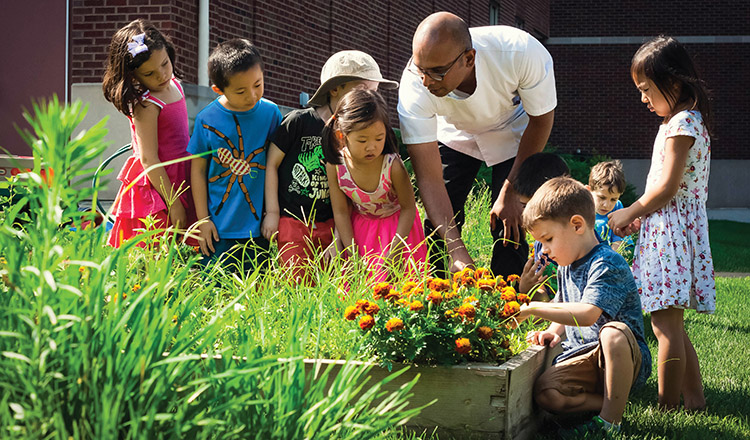Tucked behind the northwest corner of Marriott Hall lies a garden established in 2013 to grow vegetables and herbs for use in the School of Hospitality and Tourism Management food-service labs. Chef Ambarish Lulay, department chef for HTM and chef for the university president at Westwood, conceived the garden as an opportunity to educate undergraduates on farm-to-fork dining.
“Over the past five years, we have used this garden in our food labs so that students gain a deeper understanding of how produce grows and how fresh herbs make the difference in a dish,” says Lulay. “It’s good for them to observe a fresh tomato ripening on the vine.”
Two years ago, children from the Miller Child Development Laboratory School began tending to the gardens through a collaboration formed by Lulay and Elizabeth Schlesinger-Devlin, director of the lab school. The garden is divided up by classrooms, from 6 weeks to 24 months to 3 to 5 years, and each group is responsible for maintaining its assigned section.
“I wanted to create a project to help our children understand the concept of farm to table, but we didn’t have the resources to do it on a large scale,” says Schlesinger-Devlin. “This collaboration teaches our children the importance of taking care of our world.”
While planning the garden, Lulay selected plants the children could harvest and use in cooking projects. Tomatoes, sweet peppers, eggplant, and basil become toppings for pizzas that are prepared in the Marriott Hall demonstration kitchen.
“They love snacking on cucumbers and cherry tomatoes they’ve grown,” says Lulay. “We taste test different types of tomatoes to compare the flavors.”
Weekly walks to weed and water their plots instill a sense of responsibility in the children. “I notice their focus and intent,” says Schlesinger-Devlin. “It’s fun to hear them talk about how much their plants have grown.”
Lulay praises the work ethic of the young gardeners. “They take full ownership when they are given a box to weed or water,” he says. “They are like a little army, a swarm of bees.”
Both parties expect the program to continue to thrive in the coming years. “It’s been a wonderful collaboration and opportunity for our children,” says Schlesinger-Devlin. “As it grows, there are many applications for both our children and students at Purdue.”
What are your favorite hidden gems on campus? Let us know in the comments below.

